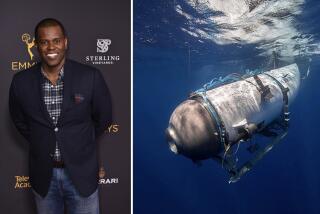Sub thriller ‘Black Sea’ plumbs depths of identity in hunt for gold

- Share via
On the surface, “Black Sea” is a gritty thriller about a submarine crew on a dangerous mission to retrieve a German U-boat supposedly filled with gold bars that sank in the Black Sea.
But director Kevin Macdonald (“The Last King of Scotland”) employs the submarine genre to tell a timely, contemporary tale of working-class men who have lost their jobs and identity and the extremes they will go through to regain both.
“They are desperate,” the Scottish filmmaker said over the phone earlier this week from New York. “To me, it was interesting to find a more contemporary, psychological motivation than ‘we just want to get rich.’ We all define ourselves by our work, and these characters have lost, in some way, their identity.”
Macdonald and screenwriter Dennis Kelly wanted “Black Sea,” which opens Friday, to be an “old-fashioned kind of movie that is not too long, with an exciting story that had some strong ideas as well. I think that combination is what interested me.”
Jude Law stars as Robinson, a submarine captain whose devotion to his career has lost him his wife and young son. And when the salvage company lays him off after 11 years, Robinson is angry and quite literally adrift.
Robinson thinks he’s found his salvation when he’s offered a chance to captain the sub. He hires a crew of Brits and Russians who have also been struggling. However, he’s so eager to get back his family, he doesn’t realize that the shady American (Scoot McNairy) who brought him into the project isn’t telling him the entire truth.
Robinson, said Law, “has nothing left.”
“In the opening scene, this guy’s skill set and the very kind of science, if you like, of building submarines is being brought into question because they talk about doing it with robots,” he adds.
Part of Law’s preparation for the film was to re-read Herman Melville’s “Moby-Dick,” because just as with the novel’s Captain Ahab, Robinson becomes obsessed to the point of losing his humanity.
“Everyone begins to doubt his sanity,” said Macdonald. “And when you are in an enclosed environment, you are so dependent on your fellow crew members, if somebody goes crazy, that has terrible consequences for all.
“Robinson is so driven by rage, but also driven by the desire to get back what he’s lost. He’s lost not just his job, but his family. He was never going to get [his family] back. Probably what he should have done was stay home and be a good father.”
Law bulked up for the role, shaved his hair and worked with a vocal coach not only to perfect a working-class Scottish accent but also to lower the timbre of his voice by almost half an octave to give it a more authoritative quality.
“You’ve got to be believable, and whatever that takes to make a three-dimensional kind of character, that is what you got to do,” said Law, who also spent time in a Royal Navy submarine. “It was a character part for me, because I am not really like that.”
Part of the reason he took the part was that he had long wanted to work with Macdonald, the grandson of the award-winning Emeric Pressburger, who made such classics as 1948’s “The Red Shoes” along with co-director Michael Powell.
“He’s [Macdonald’s] very good in preparation, very collaborative and very into your ideas and you your input,” said Law. “He was in the submarine with us, and that made it very real for us as a team.”
Macdonald’s inspiration for “Black Sea” was the K-141 Kursk disaster in 2000, when the Russian navy’s nuclear-powered cruise missile submarine sank in the Barents Sea, losing more than 100 men.
“They were stranded on the bottom of the ocean,” said Macdonald. “They were just 100 meters down, but they couldn’t get out. After several days, they were asphyxiated and died.”
Adding the Russian element to the crew of “Black Sea’s” submarine, he said, heightened the tension and the dynamics.
“If the movie is about the 1% and the 99%, boy, is that true in Russia, where you have the oligarchs taking everything and the ordinary people are sort of being abandoned to fend for themselves,” Macdonald noted. “I like the idea that you have similarities between the British characters and the Russian characters, but they don’t really know it because they don’t talk to each other.”
Studio executives wanted him to hire British actors to play Russian crew members. “But I felt it was important to have an authentic, naturalist feel to the movie, so I insisted on going to Russia,” he said. “I met with a lot of Russian actors. Two or three of them [in the movie] are among the biggest stars in Russia.”
More to Read
Only good movies
Get the Indie Focus newsletter, Mark Olsen's weekly guide to the world of cinema.
You may occasionally receive promotional content from the Los Angeles Times.











